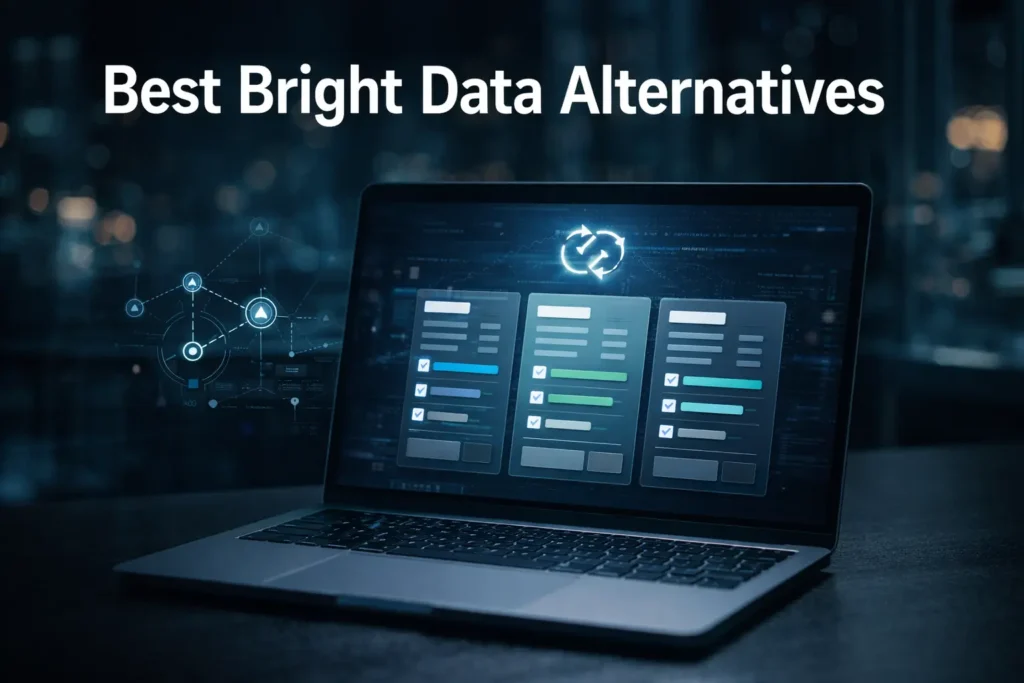The bot security market reached $732.3 million in 2023 and is forecast to grow at a 20.2% CAGR from 2024 to 2030, showing just how much websites are investing in anti-bot and anti-scraping defenses. In this environment, the best rotating residential proxies are pivotal for bypassing these measures and enabling reliable web scraping through dynamic IP rotation. By mimicking real-user traffic, they stand out in the proxy service market, ensuring accurate geolocation targeting and consistent data collection at scale.
These proxies offer a robust solution against blocking and throttling by mimicking organic user behavior, which is essential for tasks requiring high anonymity and access to geo-restricted content. They provide flexible and efficient access for a wide range of activities, from SEO monitoring to ad verification, making them a top choice among proxy solutions.
Understanding Rotating Residential Proxies
Table of Contents
ToggleRotating residential proxies, a cornerstone of modern web scraping and anonymity, leverage IP addresses assigned by Internet service providers to homeowners. This dynamic IP rotation, which changes at regular intervals, offers a vast array of benefits.
- Enhanced Anonymity: By constantly changing IP addresses, rotating residential proxies make it difficult for websites to track and identify the origin of web requests, thus preserving user anonymity.
- Overcoming IP Bans: With each rotation, users can circumvent IP bans and access restricted or blocked content without being detected, making them invaluable for web scraping and accessing geo-blocked content.
- Improved Reliability: The diverse pool of IP addresses ensures a higher success rate in accessing target websites, reducing the likelihood of encountering IP blocks, captchas, or other obstacles.
- Scalability: The dynamic nature of rotating residential proxies allows for scalability, enabling users to distribute web scraping requests across multiple IP addresses and minimizing the risk of overloading servers or triggering rate limits.
Types and Protocols
- Private vs. Shared Proxies: Private residential proxies provide exclusive access to one user, ensuring better performance, whereas shared proxies offer a cost-effective solution with potentially lower performance due to shared bandwidth.
- HTTP vs. SOCKS5: HTTP proxies, the backbone of internet browsing, contrast with SOCKS5 proxies, which support more complex tasks requiring fast data transfer, such as web scraping and file sharing.
Key Features to Look for When Choosing Rotating Residential Proxies
When selecting the best rotating residential proxies, focus on features that align with your specific needs for web scraping, data collection, or any other task requiring such proxies.
When selecting a residential proxy provider, be sure to evaluate factors like location diversity, number of IPs, speed, features, and customer support.
Source: Kifarunix, Exploring the World of Residential Proxy Networks
Here are key features to consider:
- Targeting Options: Look for providers that offer advanced targeting options by country, city, or even ISP. This flexibility ensures you can access geo-restricted content
- IP Rotation Mechanism: Time-based rotation involves changing IP addresses at predefined time intervals, such as every few minutes or hours. Session-based rotation changes IP addresses after each browsing session or session timeout. Random rotation randomly selects IP addresses from a pool without following a predefined pattern.
- Protocol and Compatibility: Ensure the proxy service supports HTTP, HTTPS, and SOCKS5 protocols and is compatible with major frameworks and AI hardware platforms like NVIDIA GPUs and Google Cloud TPUs for seamless integration into your workflow.
- Performance, Reliability, and Support:
- IP Pool Size and Geographic Coverage: A large and diverse IP pool, with a global presence, minimizes the risk of bans and provides extensive coverage.
- Uptime and Speed: High uptime guarantees and low latency are indicators of a reliable service, crucial for tasks requiring real-time data.
- Customer Support: Opt for providers like KocerRoxy, known for their responsive and helpful customer support, which can be invaluable in resolving any issues quickly.
By prioritizing these features, you can ensure that the rotating residential proxies you choose will be a powerful tool in your arsenal, offering both the performance and flexibility required for your specific applications.
Identifying Your Requirements
Identifying your requirements before selecting the best rotating residential proxies involves a thorough understanding of your project needs and how proxies can enhance your operations.
Consider the following factors to determine the most suitable solution for your needs:
| Factor | Key Question | Tips for Rotating Residential Proxies |
|---|---|---|
| Scope of Use | What exactly will you scrape and how often? | Match plan limits (GB/requests) and concurrency caps to your heaviest projected workloads. |
| Anonymity & Privacy Needs | How hard do you need to be to detect or block? | Prefer providers with a clear no-logs policy and clean residential IP pools. |
| Scalability Requirements | Will your demand stay steady or spike? | Choose services that can smoothly scale up/down without throttling or surprise overage fees. |
| Geographic Targeting | Do you need specific countries, cities, or ISPs? | Prioritise providers with strong geo coverage where your key targets are hosted. |
| Frequency of IP Rotation | How often should IPs change to avoid detection? | Use session-based for login/account flows and faster rotation for aggressive anti-bot targets. |
| Connection Speed & Stability | Can the network handle your performance needs? | Run small benchmarks on your real targets before committing to a long-term or high-volume plan. |
| Budget & Pricing Model | How much can you spend per month and per GB? | Compare effective cost per successful request, not just per GB advertised on the pricing page. |
| Technical Compatibility | Will it plug into your current tools and stack? | Confirm compatibility with your scraper framework, headless browsers, and CI/CD or task schedulers. |
| Customer Support & Reliability | How fast will they help when something breaks? | Look for providers with 24/7 support and transparent incident reporting, not just marketing claims. |
Comparing Pricing and Subscription Plans
When comparing pricing and subscription plans for the best rotating residential proxies, it’s essential to dissect the offerings in detail to ensure they align with your needs and budget.
Here’s a breakdown:
- Static ISP Proxies:
- Pricing per IP.
- Bandwidth: Usually unlimited, making it an attractive option for heavy usage without worrying about exceeding data limits.
- Rotating Residential Proxies:
- Pricing per GB, which caters to users with varying data requirements.
- Trial Offers: Free trials and money-back guarantees are commonly available, providing a risk-free opportunity to assess the service.
- Integration and Tools:
- Check integrations for your preferred tools and applications.
- Check other tools the provider offers to their users.
Consider cost and technical features when selecting a proxy service. Make sure you find a solution that offers both value and functionality tailored to your project’s demands.
Conclusion
Rotating residential proxies only pay off when they’re aligned with your exact use case, from web scraping and SEO monitoring to ad verification or multi-account management. Once you’re clear on your scope, anonymity needs, geo-targets, and budget, it becomes much easier to filter providers by the features that actually matter: rotation logic, IP pool quality, performance, tooling, and support.
Instead of chasing the biggest IP numbers or the cheapest GB, focus on reliability, consistency, and how smoothly a proxy network plugs into your existing stack. The right rotating residential proxies should quietly do their job in the background: fewer blocks, cleaner data, and more predictable results.
If you’re ready to move from theory to practice, explore rotating residential proxy plans and start testing them against your real workloads. Your metrics will quickly show which provider deserves to stay.
FAQs About the Best Rotating Residential Proxies
Q1. How Can I Select an Effective Proxy Server?
When choosing a proxy server, consider the specific needs of your intended use. For instance, to circumvent geographical content restrictions effectively, opt for a proxy service with an extensive network of IP addresses. This ensures a wider range of access and functionality.
Q2. Why Are Rotating Proxies Preferred for Managing Multiple Social Media Profiles?
For activities requiring a consistent IP address, such as managing social media accounts or online shopping, static proxies are beneficial. However, rotating proxies are superior for tasks involving web scraping and extensive data collection. These proxies offer fresh IP addresses for each session, significantly reducing the risk of detection and bans in anti-detect browsers.
Q3. Which Rotation Method Is Best: Time-Based, Session-Based, or Random?
Time-based rotation works well for steady scraping. Session-based rotation is ideal when you need a stable IP for a workflow, then a new one for the next session. Random rotation is best for highly sensitive targets with strict detection rules.
Q4. How Do I Choose the Best Rotating Residential Proxy Provider?
Check IP pool size and geo coverage, rotation options, supported protocols (HTTP/HTTPS/SOCKS5), uptime guarantees, speed, bandwidth pricing, trial or refund policy, and 24/7 support. Make sure the network integrates smoothly with your scraping tools and infrastructure.
How useful was this post?
Click on a star to rate it!
Average rating 0 / 5. Vote count: 0
No votes so far! Be the first to rate this post.
Tell Us More!
Let us improve this post!
Tell us how we can improve this post?


